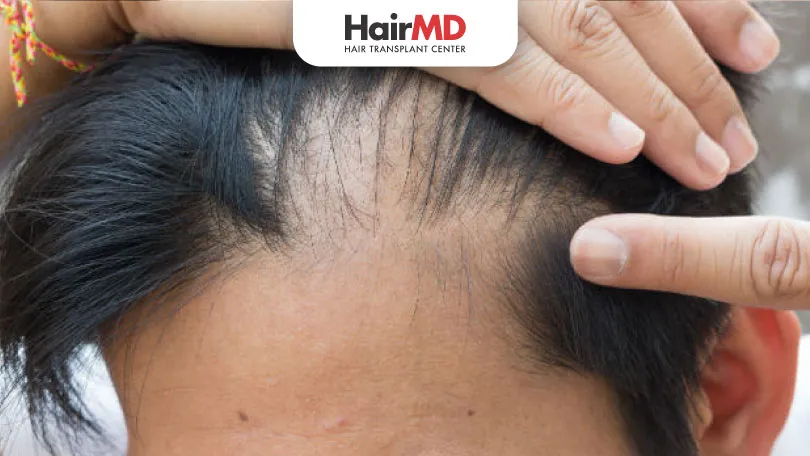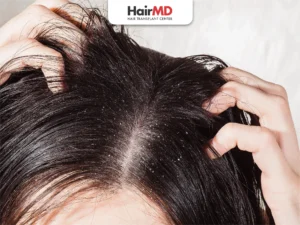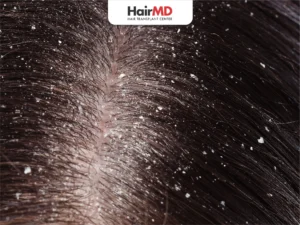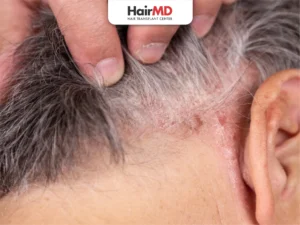20th December, 2024

What’s covered in the article?
- How to Battle Itchy Scalp and Hair Loss?
- Causes of an Itchy Scalp
- How Itchy Scalp Contributes to Hair Loss?
- Effective Solutions for Itchy Scalps and Hair Loss
- Conclusion
How to Battle Itchy Scalp and Hair Loss?
Experiencing an itchy scalp coupled with hair loss can be distressing, not just for aesthetic reasons but also because it signals underlying issues affecting your scalp and hair health. In this comprehensive guide, we will explore the intricate relationship between an itchy scalp and hair loss, delving into the root causes, their impact, and effective treatments to manage these conditions.
Itchy Scalp से Hair loss | Dr Manali Shah: HairMD Pune
Causes of an Itchy Scalp
An itchy scalp can arise from multiple factors that aggravate your skin and may harm your hair health:
Dry Scalp:
The most frequent culprit behind an itchy scalp is dryness. When your scalp lacks sufficient moisture, it becomes flaky and tight, leading to irritation. Factors like harsh weather conditions and dry indoor air can worsen these symptoms. Furthermore, using hair care products that remove essential oils aggressively from your scalp exacerbates this dryness.
Dandruff:
Dandruff manifests as white flakes of dead skin cells shedding from the scalp, often causing itchiness. This prevalent condition primarily stems from an excessive growth of the yeast-like fungus, Malassezia. Dandruff can be triggered by having an oily scalp, not shampooing enough, undergoing stress, or due to particular skin and health issues.
Scalp Infections:
Infections caused by fungi and bacteria are significant contributors to scalp itchiness. Conditions such as seborrheic dermatitis—a more intense form of dandruff—and psoriasis provoke inflammatory reactions in the scalp, leading to itching and flaking. These infections compromise the scalp’s protective barrier, increasing its vulnerability to irritation and further itchiness.
How Itchy Scalp Contributes to Hair Loss?
An itchy scalp often leads to involuntary scratching, which may seem harmless but can actually cause significant damage to hair follicles. When you scratch your scalp, you’re not just relieving an itch; you’re also potentially weakening the roots of your hair. This weakening can lead to increased hair loss, as the damaged follicles are less able to anchor the hair securely.
Moreover, conditions that typically cause scalp itchiness, such as dermatitis or psoriasis, are associated with inflammation. This inflammation doesn’t just cause discomfort—it directly impacts the hair growth cycle. Inflammatory scalp conditions disrupt the normal cycle of hair growth, which includes the growth (anagen), regression (catagen), and resting (telogen) phases. Particularly, inflammation can cause premature termination of the growth phase, leading to hair thinning and increased shedding.
Effective Solutions for Itchy Scalps and Hair Loss
Tackling the fundamental causes of an itchy scalp is critical to curbing hair loss and enhancing scalp wellness.
Here are various strategies directly aimed at alleviating discomfort and promoting scalp health:
Moisturizing Treatments:
Using moisturizing shampoos and conditioners regularly can significantly relieve dry scalp issues. These products often contain hydrating components such as aloe vera or glycerin, which not only soothe the scalp but also help maintain its moisture balance. Ensuring your scalp is well-hydrated prevents the skin from becoming flaky and tight, which often leads to itching.
Anti-Dandruff Shampoos:
Employing shampoos formulated with active ingredients like ketoconazole, selenium sulfide, or zinc pyrithione can be effective against fungal growth. These components help to minimize the flaking and itching that are characteristic of dandruff, addressing both the symptoms and underlying causes of this common scalp condition.
Medicated Topical Treatments:
For more persistent scalp conditions, topical steroids or medicated creams may be necessary. Prescribed by dermatologists, these treatments work to reduce inflammation and are effective in preventing exacerbation of hair loss. They target the inflammation that can disrupt the scalp’s natural healing processes and exacerbate hair shedding.
Scalp Masks and Essential Oils:
Natural remedies continue to be a popular choice for minor fungal and bacterial infections. Ingredients like tea tree oil, coconut oil, and peppermint oil have natural antifungal and antibacterial properties. Applying these as part of a scalp mask can reduce itchiness and support a healthy scalp environment conducive to hair growth.
Dietary Adjustments:
Improving your diet can have a positive impact on hair and scalp health. Eating a balanced diet rich in essential nutrients supports the scalp’s natural defenses and hair growth. Key nutrients include vitamin B, vitamin D, zinc, and omega-3 fatty acids, all known for their roles in maintaining healthy hair and scalp.
Professional Consultation:
should home remedies and over-the-counter treatments prove insufficient, it’s advisable to seek a professional opinion. Dermatologists specialize in skin and hair issues and can provide a comprehensive scalp examination. They can pinpoint the specific causes of your scalp’s itchiness and hair loss, offering a tailored treatment plan to effectively address these issues.
Do You Know?
Nearly 250 Patients Visit HairMD
Everyday For Various Hair Concerns?
(Your journey to healthier and fuller hair starts here!)
Meet Our Dermatologists
Conclusion
An itchy scalp and hair loss can be distressing, but understanding the causes is key to effective treatment. Issues like dandruff, infections, allergies, and skin disorders can all play a role. Consulting a dermatologist is essential for an accurate diagnosis and the right treatment. Proper scalp hygiene, a healthy diet, and suitable hair care products can help reduce irritation and prevent further hair loss.
Seeing a dermatologist at HairMD Pune ensures you get treatments tailored to your needs. Managing itchiness and addressing underlying conditions like dryness, fungal infections, or inflammation protects hair follicles and promotes healthy growth. A holistic approach tackles both symptoms and root causes, helping strengthen hair and prevent thinning.
Further Reading
Top Kitchen Ingredients to Boost Hair Growth
Discover the best kitchen ingredients for hair growth! Use coconut oil, onion juice, aloe vera & more to nourish your hair naturally and reduce hair fall.
How to Treat Alopecia Areata at Home: Natural Solutions for Hair Growth
Explore home remedies for alopecia areata to promote hair regrowth and boost confidence from home.
Redensyl vs. Minoxidil: Which is the Better For Hair Growth?
Discover the differences between Redensyl and Minoxidil for hair growth. Learn about their effectiveness, side effects, and which treatment might be better for you.
Biotin-Rich Foods for Natural Hair Growth
Know the best foods rich in biotin to help your hair to grow naturally stronger and healthier by experts from HairMD, Pune
Have thoughts? Please let us know
We are committed not only to treating you, but also educating you.














